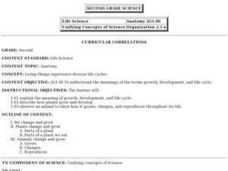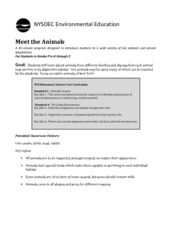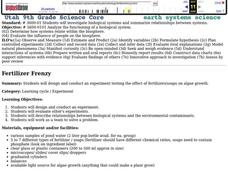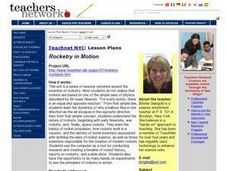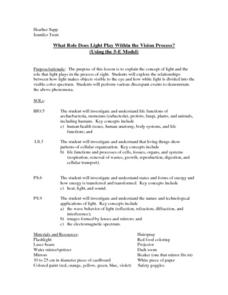Curated OER
Wetland vs. Stream Macroinvertebrates
A link to a comprehensive macroinvertebrate guide gives you the information needed to prepare for this field study activity. Sample macroinvertebrates are collected from areas representing different environmental conditions. Junior...
Curated OER
Model Volcanoes
Students represent volcanoes with models and sketches. They research volcanoes and plan how to build a model. They, in groups, build a model volcano and cause it to erupt making observations before and after the eruption.
Curated OER
Class of Gold
How can you see a number in nature? Here, learners discover both Fibonacci numbers and the golden ratio by exploring a number of different resources. Note: Some of the resources are older and may be missing some of the links, but the...
Curated OER
Evaluate Ecosystems
Ninth graders conduct an environmental inventory on one ecosystem. They collect data, and write an environmental impact statement on that area. Students explain the interactions between different systems found within an ecosystem....
Curated OER
Living Things Experience Diverse Life Cycles
Second graders will study and explain the meaning of growth, development, and life cycle. They describe how plants grow and develop and observe an animal to show how it grows, changes, and reproduces throughout its life.
Curated OER
Meet the Animals
The class will examine a series of live or stuffed animals in order to learn how different animals survive in distinctive habitats. As they examine each animal, they will be asked a series of critical thinking questions geared at getting...
Curated OER
Fertilizer Frenzy
Ninth graders design and conduct an experiment. They evaluate other's experiments. Students describe relationships between biological systems and the environmental contaminants. They work as a team to solve a problem.
Curated OER
Why Don't Whales Have Legs?
Students are given a variety of materials and are asked to design a heat loss experiment that results in a reasonable explanation of "Why don't whales have legs?" students work with the theory of natural selection.
Curated OER
Rocketry in Motion
Students investigate why a balloon flies in one direction as air escapes in the opposite direction, which helps them understand the nature of rockets and fireworks. Individually and in teams, students conduct research to create a...
Curated OER
Natural Resources and Transportation in the United States
Students study thematic maps (included with the lesson) to determine possible relationships. They develop three hypotheses about the relationship. Students choose one of their hypotheses to explain. The explanation is to include reasons...
Curated OER
Water and Ice
Students participate in various air experiments to understand that air is all around us. In this states of matter lesson, students focus on the role of air in the water cycle. Students understand that air is densest near the ground....
Curated OER
The Case of the "Lost Gorge:
Students examine the case of a map making expedition. In groups, they read a case study on "The Lost Gorge" in the Finger Lakes region of New York state. They examine maps and determine where the error in the map-making occured to end...
Curated OER
Cloud Poems
First graders make daily observations about clouds, write in their cloud books, make cloud charts, and make a poem about clouds.
Curated OER
Air Pressure is Powerful
Students make a barometer and write a paragraph describing how they did it.
Curated OER
Walking Magic
Young scholars conduct experiment with water striders by placing the insect in two different solutions and discuss their observations. They discover that weight and surface area are important factors in their experiment.
Curated OER
What in Our World Affects the Way People Live
Sixth graders study various maps that show geographical features and population. They compare the maps and make inferences about how various geographical features influence the population and human activities of an area.
Curated OER
Seasons and Cloud Cover, Are They Related?
Students use NASA satellite data to see cloud cover over Africa. In this seasons instructional activity students access data and import it into Excel.
Curated OER
What Role Does Light Play Within the Vision Process?
Students are introduced to the relationship between light and vision. In groups, they participate in experiments to discover how different wavelengths are divided in the visible spectrum. They record their answers and discuss their...
Curated OER
What Happened?
Students read legends about volcanoes. They develop their own legend and shares them with the class. They practice their writing skills as well.
Curated OER
Wonderful Water
Students identify the various states of water and its natural flow downward. As a class, students take digital pictures of different forms of water and create a multimedia presentation describing their photographs. Groups of students...
Curated OER
Insect Monitoring
Students practice the scientific method in the classroom, either in preparation or as a substitution for real-world field experience. They examine a simulated biodiversity research situation, using a "mini-plot" or
sampling square...
Curated OER
Simple Harmonic Motion with Dr. DAQ
Young scholars study the work and accomplishment of Galileo. In this physics lesson, students calculate the period of a pendulum's using a mathematical equation. They explain the different factors affecting its period.
Curated OER
Do Medicines Grow on Trees and Plants?
Learners study the importance of preserving rainforest. They investigate the uses of rainforest plants for medicinal uses by participating in rainforest immersion activities.
Curated OER
Wetland Plant Detectives
Sixth graders identify plants in the wetlands. In this plant detectives lesson, 6th graders complete a scavenger hunt on a local reserve, record observations, and respond in their journals.






